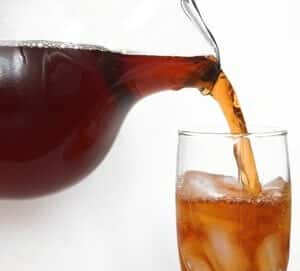
Q. I can’t drink coffee because it upsets my stomach. I usually start the morning with two or three cups of hot tea (preferably English Breakfast or Earl Grey), and I drink iced tea with lunch and dinner. In the summer I always have a pitcher in the fridge.
My doctor has diagnosed me with anemia and I am taking an iron supplement. It doesn’t seem to be helping, however, and I still feel exhausted a lot of the time. My sister-in-law read in a magazine that tea could contribute to anemia. Is this true?
A. Tea, whether hot or iced, can dramatically reduce the amount of iron absorbed from supplements and plant-based foods. Cases of anemia have been reported in heavy tea drinkers.
If you are taking your iron pill at meal time, there is a strong likelihood that the tea you drink is interfering with its effectiveness. Swallow your pill with fruit juice or vitamin C and allow several hours to lapse before you have more tea. By the way, coffee also diminishes iron absorption somewhat.
Scientific Support
Please do not take our word for this interesting interaction between tea and a crucial nutrient. Here is an article in the journal Critical Reviews in Food Science and Nutrition:
“Iron deficiency is a major world health problem, that is, to a great extent, caused by poor iron absorption from the diet. Several dietary factors can influence this absorption. Absorption enhancing factors are ascorbic acid and meat, fish and poultry; inhibiting factors are plant components in vegetables, tea and coffee (e.g., polyphenols, phytates), and calcium…Recommendations with respect to tea consumption (when in a critical group) include: consume tea between meals instead of during the meal; simultaneously consume ascorbic acid and/or meat, fish and poultry.”
If you find such nutrient interaction issues of interest you may wish to download our free Guide to Drug and Nutrient Interactions.

